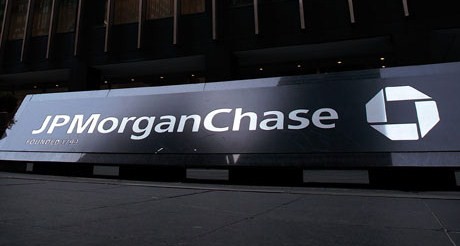J.P. Morgan, Other Banks Boost Dividends After Fed Tests

Bernanke gives the go ahead for banks to raise dividends and repurchase stock. No need to protect capital for insolvency.
---
JPMorgan, Others Boost Dividends After Fed Tests
(Reuters) - U.S. regulators gave major banks including JPMorgan Chase & Co the green light on Friday to boost dividends, loosening the reins on the industry 2-1/2 years after the government bailed out the financial system.
The strongest banks, including JPMorgan, are entitled to raise dividends and buy back shares in a matter of weeks, while weaker banks, including SunTrust Banks Inc, were authorized to issue shares and pay back government bailout money.
The Federal Reserve tested how banks would fare if the economy were to come under more pressure, in another round of stress tests nearly two years after the first round. European banks face similar tests.
Banks received billions of dollars of rescue funds from the government in 2008 and 2009 after suffering huge losses in a credit crunch. But in 2010 the banking system turned a profit, emboldening regulators to permit banks to return money to shareholders through dividends and buybacks.
"This is one of the final steps in terms of showing the redemption of the banks from 2008," said Matt McCormick, a portfolio manager at Cincinnati-based Bahl & Gaynor Investment Counsel, which owns bank stocks.
---
(Reuters) - Wells Fargo & Co said on Friday that it would issue a special cash dividend to its common stockholders, following the results of the Federal Reserve's second round of stress tests.
http://www.reuters.com/article/2011/03/18/us-wellsfargo-dividend-idUSTRE72H5G220110318
---
LONDON — Before the crisis, financial regulators were often accused of being in thrall to bankers. Today, they are in greater danger of being captured by academics. British boffins have recently got bogged down debating whether banks should hold significantly higher levels of equity. Even if the idea is right, it is not remotely realistic. Policymakers should concentrate on more modest but practical reforms.
The latest debate was started by David Miles, a finance professor and member of the Bank of England’s interest rate-setting committee. Miles applied the Miller-Modigliani theory of capital structure to banks, and concluded that the economy would be better served if they held capital equivalent to 16 percent to 19 percent of their risk-weighted assets. Basel bank regulators have agreed a 7 percent ratio.
http://blogs.reuters.com/columns/2011/03/17/bank-capital-debate-obscures-more-urgent-reform/
---
Adverse scenario for U.S. bank stress tests
http://www.reuters.com/article/2011/03/18/us-usa-banks-stresstests-fb-idUSTRE72H4SQ20110318

 Mar 19, 2011 at 6:52 PM
Mar 19, 2011 at 6:52 PM
Reader Comments (10)
http://www.reuters.com/article/2011/03/18/us-wellsfargo-dividend-idUSTRE72H5G220110318
http://www.reuters.com/article/2011/03/18/us-bbt-dividend-idUSTRE72H5CT20110318
I enjoyed moderating my SXSW panel yesterday on whether and how Internet startups are disrupting the banking system. There was a good range of small, tech-savvy panelists, and they’re attacking the financial giants in very different ways.
http://blogs.reuters.com/felix-salmon/2011/03/16/disrupting-the-banking-system/
The latest debate was started by David Miles, a finance professor and member of the Bank of England’s interest rate-setting committee. Miles applied the Miller-Modigliani theory of capital structure to banks, and concluded that the economy would be better served if they held capital equivalent to 16 percent to 19 percent of their risk-weighted assets. Basel bank regulators have agreed a 7 percent ratio.
http://blogs.reuters.com/columns/2011/03/17/bank-capital-debate-obscures-more-urgent-reform/
Below are details of the adverse economic conditions the Fed used to test the durability of banks' financial health:
2011:
Real GDP*: -1.5
Unemployment Rate**: 11.0
National House Price Index*: -6.2
Equity Price Index*: -27.8
2012:
Real GDP: 2.4
Unemployment Rate: 10.6
National House Price Index: -4.1
Equity Price Index: 36.9
2013:
Real GDP: 3.4
http://www.reuters.com/article/2011/03/18/us-usa-banks-stresstests-fb-idUSTRE72H4SQ20110318
http://www.reuters.com/article/2011/03/18/us-usbancorp-dividends-idUSTRE72H5IV20110318
---
It's probably difficult to model, but I think they should have considered the tail risk that Eric Holder manages to free his head from BofA's ass.
http://www.nytimes.com/2011/03/19/business/economy/19nocera.html?ref=joenocera
"And thus the real purpose of the hearing: to allow the Republicans who now run the House to box Ms. Warren about the ears. The big banks loathe Ms. Warren, who has made a career out of pointing out all the ways they gouge financial consumers — and whose primary goal is to make such gouging more difficult. So, naturally, the Republicans loathe her too. That she might someday run this bureau terrifies the banks. So, naturally, it terrifies the Republicans....
It’s not just the House Republicans either. Already the Office of the Comptroller of the Currency has reverted to form, becoming once again a captive of the banks it is supposed to regulate. (It has strenuously opposed the efforts of the A.G.’s to penalize the banks and reform the mortgage modification process, for instance.) The banks themselves act as if they have a God-given right to the profit they made precrisis, and owe the country nothing for the trouble they’ve put us all through. The Justice Department has essentially given up trying to make anyone accountable for the crisis."
What's the fucking use?
Apologies if you already covered this.
http://www.huffingtonpost.com/2011/03/17/ex-goldman-banker-smear-elizabeth-warren_n_837185.html
Ex-Goldman Banker Behind WSJ 'Smear Campaign' Against Elizabeth Warren